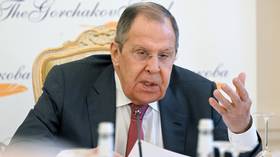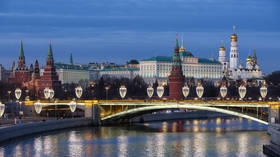Slavoj Žižek: Omicron bares the world’s real pandemic

Reaction to Covid’s latest strain has confirmed an unpalatable truth – while many embrace the idea of collaboration to fight the pandemic, they’re doing nothing tangible of any worth. Do we need an even greater crisis to rouse us?
We are all aware by now that the World Health Organization has declared a new variant of concern of Covid-19, named Omicron.
The new B.1.1.529 variant was first reported to the WHO in South Africa on November 24. It comes with more than 30 mutations and the suspicion is that it spreads much faster than other variants – including the Delta one – so it is uncertain if the vaccines we currently have will work against it.
The reaction all around the world was predictable: flights from southern Africa canceled, stocks plunging, and so on.
Isn’t it appalling that such defensive moves as travel bans were the strongest reaction in developed countries to the specter of a new disaster? As Dr. Richard Lessells, an infectious diseases specialist at the University of KwaZulu-Natal in Durban, South Africa, pointed out, “There was no word of support that they’re going to offer to African countries to help them control the pandemic and particularly no mention of addressing this vaccine inequity that we have been warning about all year and [of which] we are now seeing the consequences play out.”
The spread of the Omicron variant was facilitated by a triple scandalous neglect. Firstly, the virus is much more likely to mutate in places where vaccination is low and transmission high, so the huge gap between vaccination rates in the developed world and in the developing world is likely to blame. Some Western countries are even destroying vaccines whose date of usage has passed, rather than give them for free to countries with a lower vaccination rate.
Secondly, as was recorded in The Lancet in April, “Pharmaceutical companies have benefited greatly from huge sums of public funding for research and development: between US$2·2 billion and $4·1 billion (by Feb 1, 2021) were spent in Germany, the UK, and North America.” However, when the companies were solicited to allow free licensing of the vaccines, they all refused it, thus preventing many poorer countries – which couldn’t afford to pay the copyright price – from producing them.
Finally, even in the developed countries themselves, pandemic nationalism very quickly prevailed over a serious coordination of efforts.
In all three cases, the developed countries failed to pursue their own publicly proclaimed goals, and they are now paying the price. Like a boomerang, the catastrophe we tried to contain in the Third World has come back to haunt us. How?
Friedrich Jacobi, the German philosopher active around 1800, wrote: “La vérité en la repoussant, on l’embrasse,”– in repelling the truth, one embraces it. Examples of this paradox abound – say, the Enlightenment really won against traditional faith and authority when the partisans of traditional view began to use Enlightenment rational argumentation to justify their stance (a society needs firm unquestionable authority to enjoy a stable life etc.)
But does the same also hold the opposite way? Is it that in embracing the truth, one repels it? This is exactly what is happening today: ‘truth’ – the urgent need for global cooperation etc. – is repelled by publicly embracing the need for green action or collaboration in battling the pandemic, as was seen at the Glasgow COP26 conference, which was full of declarative blah blah but delivered very little in the way of precise obligations.
This mechanism was already described back in 1937 in ‘The Road To Wigan Pier’ by George Orwell, who deployed the ambiguity of the predominant leftist attitude toward the class difference: “We all rail against class-distinctions, but very few people seriously want to abolish them. Here you come upon the important fact that every revolutionary opinion draws part of its strength from a secret conviction that nothing can be changed. /…/ So long as it is merely a question of ameliorating the worker’s lot, every decent person is agreed. /…/ But unfortunately, you get no further by merely wishing class-distinctions away. More exactly, it is necessary to wish them away, but your wish has no efficacy unless you grasp what it involves. The fact that has got to be faced is that to abolish class-distinctions means abolishing a part of yourself. /…/ I have got to alter myself so completely that at the end I should hardly be recognizable as the same person.”
Orwell’s point is that radicals invoke the need for revolutionary change as a kind of superstitious token that should achieve the opposite – i.e. prevent the change from really occurring. Today’s academic leftists who criticize the capitalist cultural imperialism are, in reality, horrified at the idea that their field of study would break down.
And the same goes for our fight against the pandemic and global warming – a paraphrase of Orwell would be: “We all rail against global warming and the pandemic, but very few people seriously want to abolish them. So long as it is merely a question of ameliorating the lot of ordinary people, every decent person is agreed. But unfortunately, you get no further by merely wishing global warming and the pandemic away. More exactly, it is necessary to wish them away, but your wish has no efficacy unless you grasp what it involves. The fact that has got to be faced is that to abolish global warming and the pandemic means abolishing a part of yourself. Each of us will have to alter him/herself so completely that at the end s/he will hardly be recognizable as the same person.”
Is the reason for this inactivity simply the fear of losing one’s economic and other privileges? Things are more complex than that: the change that is required is double – subjective and objective.
The US philosopher Adrian Johnston characterized today’s geopolitical situation as one “in which the world’s societies and humanity as a whole are facing multiple acute crises (a global pandemic, environmental disasters, massive inequality, ballooning poverty, potentially devastating wars, etc.), yet seem unable to take the (admittedly radical or revolutionary) measures necessary to resolve these crises. We know things are broken. We know what needs fixing. We even sometimes have ideas about how to fix them. But, nevertheless, we keep doing nothing either to mend damage already done or to prevent further easily foreseeable damage.”
Where does this passivity come from? Our media often speculate which hidden motives make anti-vaxxers so adamantly persist in their stance, but as far as I know, they never evoke the most obvious reason: at some level, they want the pandemic to continue, and they know that refusing anti-pandemic measures will prolong it.
If this is the case, then the next question to be raised is: what makes the anti-vaxxers desire the continuation of the pandemic?
We should avoid here any pseudo-Freudian notions like some version of death-drive, of a wish to suffer and die. The idea that anti-vaxxers oppose anti-pandemic measures because they are not ready to sacrifice the Western liberal way of life, which for them is the only possible frame of freedom and dignity, is true, but not enough. We should add here a perverse enjoyment in the very renunciation to ordinary pleasures that the pandemic brings about. We should not underestimate the secret satisfaction provided by the passive life of depression and apathy, of just dragging on without a clear life project.
However, the change that is required is not just subjective, but a global social change. At the beginning of the pandemic, I wrote that the disease would deal a mortal blow to capitalism. I referred to the final scene of Quentin Tarantino’s ‘Kill Bill 2’ where Beatrix disables the evil Bill and strikes him with the ‘Five Point Palm Exploding Heart Technique’, the combination of five strikes with one’s fingertips to five different pressure points on the target’s body. After the target walks away and has taken five steps, their heart explodes in their body and they fall to the ground.
My point was that the coronavirus epidemic is a kind of ‘Five Point Palm Exploding Heart Technique’ attack on the global capitalist system – a signal that we cannot go on the way we have until now, that a radical change is needed.
Many people laughed at me afterwards: capitalism not only contained the crisis, but even exploited it to strengthen itself. I still think I was right, though. In the past few years, global capitalism has changed so radically that some (like Yanis Varoufakis or Jodi Dean) no longer call the new, emerging order capitalism, but corporate neo-feudalism. The pandemic gave a boost to this new corporate order, with new feudal lords like Bill Gates or Mark Zuckerberg increasingly controlling our common spaces of communication and exchange.
The pessimistic conclusion that imposes itself is that even stronger shocks and crises will be needed to awaken us. Neoliberal capitalism is already dying, so the forthcoming battle will not be the one between neoliberalism and what lies beyond, but the one between two forms of this aftermath: corporate neo-feudalism which promises protective bubbles against the threats – like Zuckerberg’s ‘metaverse’, bubbles in which we can continue to dream – and the rude awakening which will compel us to invent new forms of solidarity.
The statements, views and opinions expressed in this column are solely those of the author and do not necessarily represent those of RT.
















